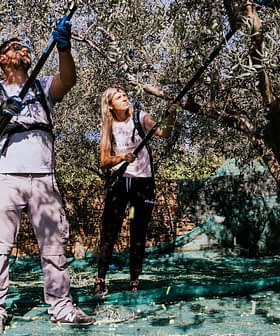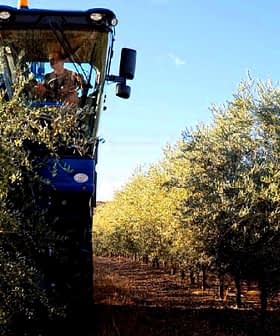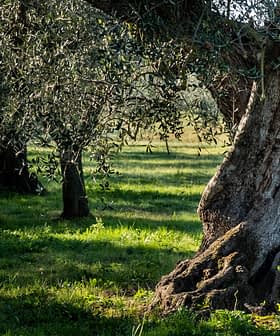A record-breaking harvest has also yielded Albania’s first-ever award at the 2023 NYIOOC World Olive Oil Competition.
The Illyrian Press earned a Gold Award for an organic Kalinjot, an endemic olive variety, at the world’s largest olive oil quality competition and joined elite brands from 28 other countries in the Official Guide to the World’s Best Olive Oils.
(Albania is) a region with tremendous potential. And it doesn’t surprise me that it can produce some high-quality olive oil.
“First of all, it’s really exciting to win,” owner Andrew Strong told Olive Oil Times. “I think it’s generally a pretty exciting time in Albania.”
Strong first visited Albania in 2005 and was immediately impressed by the southeastern European country’s mountainous landscape and culture.
See Also:Producer ProfilesHowever, he said the infrastructure was severely underdeveloped. When he first visited the country, it would take him 15 hours to make the 100-kilometer journey from Tirana, the national capital, south to Vlorë, where his olive groves are located. “Now it’s a two or three-hour trip,” he said.
“It’s a region with tremendous potential,” Strong added. “And it doesn’t surprise me that it can produce some high-quality olive oil.”
Shortly after his first visit, Strong met Vesaf and Bruno Musaj. The father-son team is now responsible for producing The Illyrian Press’s extra virgin olive oil.
“In 2006/07, I met Bruno and Vesaf, who had been producing olive oil at a very small scale,” he said. “I tasted their olive oil, and the quality was such that I couldn’t walk away. I was compelled to start this project and bring the olive oil to the United States.”
By 2010, Strong started The Ilyrrian Press, named after the Indo-European-speaking people who lived in the region more than 2,000 years ago. His first harvest took place in 2012.
Strong said the company had faced plenty of challenges in the decade since production began. However, the unique flavors and high polyphenol content of theKalinjot extra virgin olive oil convinced him that the time and effort would pay off.
Now, the company imports olive oil to the U.S., selling it mainly around East Hampton, New York. Strong said he entered the NYIOOC because he felt his team was ready.
Along with a bumper harvest – which Ministry of Agriculture officials estimate at a record-high 25,000 tons, more than double the average of the previous five seasons – Bruno Masaj told Olive Oil Times through a translator, Alban Rafuna, that quality was also as high as ever.
“The production quality is approximately the same throughout all years,” he said. “One of the main differences is the time when it rains, and this year happened to have the rainfall at a specifically good time for the development of the olives.”
Strong added that the production team had heard from local growers from whom they buy olives that this year would be a good harvest. “That corresponded with having better infrastructure in place, and we thought this was the moment to enter the NYIOOC,” he said.
According to Masaj, Albania’s bumper harvest can mainly be attributed to young olive trees planted 15 years ago entering maturity.
He added that olive cultivation in the country swiftly expanded after the transition from a single-party communist state to a democracy 30 years ago. This was mainly due to agrarian reforms, which saw individual families receive plots of land and the freedom to plant what they wished instead of what was mandated by state-run cooperatives.
With a long history of olive oil production, mountainous terrain featuring well-drained soil, hot and sunny summers with low humidity and mild, wet winters, Albania is well-suited to olive cultivation which quickly expanded.
When Strong first began production, he said the only viable business plan for the company was to export to the United States.
“Once we put the money forward to get the quality we were looking for, the price point [of selling the olive oil domestically] just didn’t work,” he said.
However, Strong added that the trade infrastructure between Albania and the United States was poorly developed.
“The first year, we had to hire our own container for a very small quantity of olive oil because there was no container to share to bring it to the United States,” Strong said. “As we’ve scaled up, we’ve had to basically develop that infrastructure to move product from Albania to the United States.”
According to the Observatory for Economic Complexity, a database affiliated with the Massachusetts Institute of Technology, total exports from Albania to the United States rose from $29.7 million in 2010 to $65.8 million in 2021.
While table olives have become the country’s third most significant agricultural export to the U.S. – valued at $233,000 in 2021 – olive oil exports are negligible.
However, The Illyrian Press now has a well-established supply chain. Strong said this process begins with local farmers who sell their olives to the company, adding that a big part of the company’s success comes from cultivating these strong relationships.
With flowering yet to occur in Albania, Masaj said it is still too early to forecast how the 2023/24 crop year will unfold. Still, he is confident that the coming harvest will also be fruitful and said quality will likely be as high as ever.
“Considering the historical data that shows that the production has been increasing at an increasing rate every year, this makes us feel and believe that it will be another good harvest,” he said.
“Besides the quantity, we will concentrate aggressively on having a quality production by picking olives from old trees, choosing trees on elevated land and trying to pick the olives from the crown of the trees, which are more exposed to the sun,” Masaj concluded.









